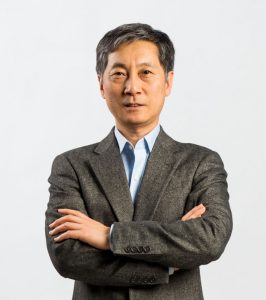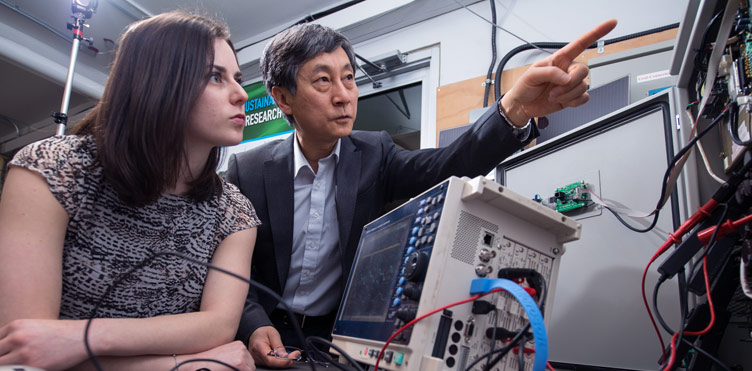Impacting the World with Smart-Grid Research and Technology at UNB
Author: Engineering Alumni Office
Posted on Jun 23, 2017
Category: Research Spotlight
You may have heard that advanced smart grid technologies are poised to revolutionize conventional power grids worldwide. But you may not know that Dr. Liuchen Chang, UNB professor in electrical and computer engineering and lead researcher for the Emera and NB Power Research Centre for Smart Grid Technologies at UNB, has been working on renewable energy technologies and optimized distribution since the early 1990’s.

For the past 20 years, Dr. Chang and his research group studied and developed innovative technologies in renewable energy and distributed generation systems. Over the last decade, that research has expanded into developing intelligent load management for smart grid systems, helping utilities transform their conventional electric power systems into low-carbon smart grids.
He explains that “to move forward, we need a new kind of electric grid that can automate and manage the increasing complexity and needs of electricity in the 21st Century. We’re combining power infrastructure with communications infrastructure, and including intelligence and security technology. And so we’ve expanded from developing renewable energy based electricity production systems at consumers’ sites (rather than just having the grid deliver from big plants) to developing smart tech that can better manage loads, tap into thermal storage, and revolutionize both small and large generation sites.”
A healthier power system with manageable loads will reduce the frequency of power outages, allow power companies to take pre-emptive action before a system shows weakness, and reduce the use of more expensive generators in serving peak load. The smart grid will be able to accommodate more renewable energy sources and could even result in electric vehicles storing energy for consumers. That kind of research has global impact. Barbados currently uses 100% fossil fuels, but in 30 years could transition to 100% renewable energy because of smart grid and the collaborative research done at UNB in partnership with Emera.
“The technologies we have been working on are emerging technologies and are experiencing fast growth throughout the world,” Chang said. “The opportunities for countries, regions, entrepreneurs, businesses, utilities, and consumers are immense.”
For consumers, it will allow us to manage loads in an optimized way to reduce costs. And it will allow us to actually participate in energy markets by increasing and decreasing load on the system, with the potential to even make money from our appliances.
In January, 2017, The Emera & NB Power Research Centre for Smart Grid Technologies was launched with a $6.2 investment from Emera. The investment includes support for a collaborative project to research, develop, deploy and demonstrate smart grid technologies within select Emera assets, thereby further applying and advancing the university’s knowledge in the smart grid field.

Currently, the Centre has 37-40 people working on tech development and innovation and Chang plans to grow that number to around 60 in the next two years with researchers from across multiple disciplines. This will enable a true research supercluster in smart-grid tech and renewable energy and distribution.
He also plays a pivotal role in the Smart Grid Innovation Network, a collaboration between UNB, Siemens and NB Power with a mission to drive and support a smart grid ecosystem and enable the successful deployment of smart grid initiatives in New Brunswick. Along with this he is also the lead researcher involved in PowerShift Atlantic, a collaborative initiative led by NB Power, in partnership with Saint John Energy, Maritime Electric, Nova Scotia Power, New Brunswick System Operator, the University of New Brunswick, the Government of New Brunswick, and the Government of Prince Edward Island.
Chang is obviously a busy man, but always has time to explain his work and give most of the credit to his team of researchers. “I think the University of New Brunswick is a great place to work for engineers”, he said. “It’s a small university where everybody’s close to each other. It’s a natural environment for collaborations to form and innovation to spring up as a result.”
